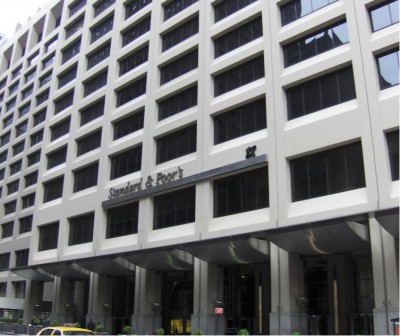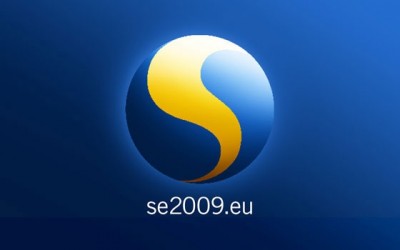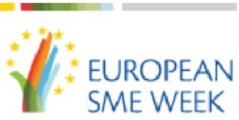 In Brief
In Brief  Dégradation de la Turquie par S&P: la bulle financière de croissance artificielle risque à crever ?!
Dégradation de la Turquie par S&P: la bulle financière de croissance artificielle risque à crever ?!
Dégradation de la Turquie par S&P: la bulle financière de croissance artificielle risque à crever ?!

Ceux qui prêtent ou cherchent à exporter en Turquie risquent d'avoir des problèmes, car la prétendue "croisssance" Turque était, en réalité, une simple stimulation de la démande interne par des crédits obtenus d' emprunts à court-terme à l'exterieur du pays, exposé au risque d'une soudaine diminution de son re-financement externe, qui ferait ecrouler l'ensemble, revèle la récente décision de l' Agence Internationale de Notation "S&P" à dégrader le crédit d' Ankara, le descendant de "positif" à "stable" (comme actuellement en Grèce), et maintenant la note "BB" en devices, tandis que son PIB, qui, après avoir chuté environ -5% en 2009, devrait arriver, selon le Gouvernement Turc à + 4% en 2012, en réalité, sera seulement à +2% selon S&P, au même moment qu' une Inflation montante arriva à plus de +11% en avril...
La Turquie dépend des financement extérieurs pour alimenter sa croissance, selon S&P, qui dénonce le fait que "la forte croissance des dernières années, ..."a été ......financé principalement par des Emprunts Extérieurs à Court-terme auprès des Banques".
Ces crédits ont gonflé la demande intérieure, "contribuant à la croissance rapide du PIB", notamment par l'importation massive de biens de consommation. revèle un communiqué.
Mais, maintenant, "des conditions commerciales qui se Dégradent (le prix des exportations comparé à celui des importations) ont, ....rendu plus délicat le rééquilibrage économique" de l' Economie Turque, qui affronte aussi une Chute des Exportations avec "une demande extérieure moins ferme ".
Vu aussi la "Dette Extérieure élevée" de la Turquie, "et la dépendance du budget de l'Etat aux impôts indirects", cela peut peser, selon S&P qui réaffirme la note de "BB" en devises, qui ne devrait pas évoluer avant douze mois. Cette note signifie que la Turquie fait "face à des Incertitudes Majeures actuellement, et est exposée à des conditions financières ou economiques adverses, qui pourraient provoquer une incapacité de faire face à ses obligations financières").
La Turquie est, en effet, dévenue particulièrement vulnerable à un risque soudain qui pourrait affecter son réfinancement externe, et/ou à une sortie soudaine de flux financiers, avertit Standard & Poor.
Une grave crise de l' Economie Turque en 1999 avait vu le Ministre des Finances sauter par la fenêtre, et la monnaie du pays plonger ensuite en bas, dans un "Krach" Monétaire en 2000-2001, d'où Ankara n'est pas sortie que seulement grâce à la réconnaissance, notoirement controversée et impopulaire, d'un statut de "Candidat à l' Adhésion" dans l'UE, qui lui assura un révenu régulier d'environ 850 Millions € chaque année, ainsi que des facilités d'emprunts, par l'UE, qui est, pourtant, de plus en plus contesté et ménacé, sinon de coupure ou suspension, au moins de réduction, pendant la présente période d' Economies Budgétaires dans toute l' Europe..
En 2009, plongée dans la récession du fait de la crise mondiale, l'économie turque s'était contractée d'environ - 5% en recession. Le gouvernement turc prévoit une chute de +7% à seulement +4% en 2012, en nette baisse en raison de la crise, mais S&P table sur une moindre augmentation du PIB réduite à +2%....
En plus, le FMI a averti de faire attention à la hausse de l' Inflation, qui a été plus de + 11 % sur les prix de consommation seulement pour les 4 premiers mois de l' année (Janvier - Avril) 2012.
Réagissant, le Prémier Ministre Turc, Tayip Erdogan, a accusé l' Agence de Notation Internationale d' être "absurde" (sic !), et a menacé de ..."ne plus reconnaître SP comme une institution" crédible d'évaluation financière....
M. Erdogan réfuse déjà de réconnaître Chypre, pays-membre de l'UE, comme il déclara dépuis le 29 juillet 2005, ce qui provoqua une réponse officielle de l'UE en septembre 2005 et le "gel" de certains chapitres de Négoc iation dépuis décembre 2009, et ajoute le risque supplementaire de tensions accrues vis a vis l'UE, lorsque Nicosie assumera la Présidence tournante du Conseil de l'UE entre juillet et décembre 2012, tandis que les démandes de "suspension" des négociations UE - Turquie se multiplient, récemment, même au sein du Parlement Européen, alimentées par des soucis d' immigration illégale massive et/ou d'aggravation récente des violations des droits de l'homme particulièrement sérieuses, commises par les Autorités Turques.
***
Main Menu
Home Press Deontology/Ethics 2009 Innovation Year EU endorses EuroFora's idea Multi-Lingual FORUM Subscribers/Donors FAQs Advanced search EuroFora supports Seabird newsitems In Brief European Headquarters' MAPs CoE Journalists Protection PlatformBRIEF NEWS
- 00:00 - 02.06.2021
- 00:00 - 18.10.2020
- 00:00 - 19.06.2020
- 00:00 - 18.05.2020
- 00:00 - 20.04.2020
- 00:00 - 02.02.2020
- 00:00 - 09.12.2019
- 00:00 - 27.11.2019
- 00:00 - 16.11.2019
Popular
- Yes, we could have prevented Ferguson riots says World Democracy Forum's Young American NGO to ERFRA
- Spanish People Elect CenterRIGHT Majority with 1st Party and Total of 178 MPs (6 More than the Left)
- Pflimlin's vision
- The European Athletic "Dream Team", after Barcelona 2010 Sport Championship Results
- Source Conseil d'Europe à ERFRA: Debatre Liberté d'Opposants à Loi livrant Mariage+Enfants à Homos ?
- Head of BioEthics InterGroup, MEP Peter Liese : "Embryonic stem cell research reaching its END" !?
- Spain: Jailed Turkish Terror suspect with Explosive,Drones,Chechen accomplices stirs Merah+ Burgas ?
- UN Head Ban Ki Moon at CoE World Democracy Forum : - "Listen to the People !"
Latest News
- EUOmbudsmen Conference 2022: Digital Gaps affect People's Trust threaten EF Project on EU Future ?
- French Election : Black Out on Virus, but Obligation for Fake 'Vaccines" Challenged
- Both French Presidential Candidates point at "Humanism" in crucial times...
- France : Zemmour = Outsider may become Game Changer in Presidential + Parliamentary Elections 2022
- PACE President Cox skips Turkey Worst (Occupation) case compared to Russia (DeMilitarisation) query
Statistics
Lankytojai: 56811908Archive
Login Form
Other Menu

The incoming Swedish EU Presidency (July-December 2009) may still remain in favour of Turkey's controversial EU bid, despite June 2009 EU Elections' results, but it has "very strong demands on Turkey"'s obligation to respect EU Rules, said the Head of Swedish Foreign Ministry's Press Service, Cecilia Julin, to "EuroFora", reacting to critical Press reports.
- "I know (that) the link is often made also to Sweden's position on Turkey"'s controversial EU bid. Indeed, "we (Swedish EU Presidency) are very much engaged in the future membership of Turkey, but not without fullfiling all the Criteria".
- "It's very clear that we (Swedish EU Presidecny) have very Strong Demands on Turkey, in a sort of concept for Future membership of the Union, ...which will be a Long Process...", she stressed.
This means, in particular, "the Copenhagen Criteria (on Human Rights, Democracy and Rule of Law), and also the adaptation to the Acquis of the European Union".
- "If you listen to what Mr. Bildt (the Swedish Foreign Minister) says on Turkey at different occasions, it's very clear : We want Turkey to become part of the Union, in the Future. But we want it to fullfil all the Criteria : The Acquis of the European Union. That's very clear", she concluded.
The Senior Official of the Swedish Foreign Ministry was reacting to critical Press Reports, from Brussels' Journalists invited by EU Commission's secretariat to Stockholm, who claimed that Bildt was abusing of a ..."Whip" (sic !) against Cyprus, by "threatening" the presence of UNO's Peace-keeping force at the "Green line" which separates the island's Government-controlled areas from the territories occupied by Ankara's army, if Nicosia didn't accept any political solution, regardless of Turkey's demands, before the end of 2009.
Governing AKEL Party's new Secretary General, Andros Kyprianou, reacted by declaring that no-one can threat the People of Cyprus : -"We shall decide for our Future, and nobody else", he reportedly said, asking to "keep calm". "In order to find a Solution soon, certain basic Principles must be respected", he stressed, calling those who feel an urgency to use their influence on Turkey. Other Political Parties were more critical.
This was a reference to recently reported statements by Turkish Minister Bagis, Prime Minister Tayip Erdogan and Turkey's National Security Council (a Military-Political body), accused to push towards a partitionist "2 States" solution, contrary to UNO SC Resolutions for Cyprus' reunification.
December 2009 is a crucial moment for EU's appraisal of Turkey's controversial EU bid, because EU Council has decided to review then Ankara's compliance with the European position on the recognition of Cyprus' Government, which was clearly set out by an EU reply of 21 September 2005 to Turkish Prime Minister Tayip Erdogan's claims, refusing to recognize even the existence of EU Member Cyprus, in controversial statements he made to London (former EU chair) on July 29, 2005.
EU Parliament's latest Resolution on Turkey, adopted on March 2009 in Strasbourg, warned Ankara that "the non-fulfillment of Turkey's commitments... by December 2009, may further seriously affect the process of Negotiations" with the EU.
In practice, the issue boils down to Ankara's "embargo" against Ships and Airplanes using Cyprus' seaports or airports at the strategic EU island, which traditionaly hosts one of the World's biggest Shipping flags. EU has already "freezed" 6 relevant Chapters in EU - Turkey Negotiations since December 2006, after Ankara refused to fullfil a commitment it had undertaken when EU had decided to open controversial "accession" negotiations with Turkey, back on December 2005.
- "As far as EU - Turkey relations are concerned, it's clear that Turkey needs to fullfil its obligation of full, non-discriminatory implementation of the additional Protocol (to "EC-Turkey Association Agreement"), This is an important issue....and should be addresseed as soon as possible as it clearly affects the pace of the accession negotiations.Issues covered by the Declaration of September 2005 will continue to be followed up, and progress is urgently awaited", warned earlier in Strasbourg the out-going Czech EU Presidency (former vice-Prime Minister Alexander Vodra).
But the Head of the Swedish Foreign Ministry's Press Service, Cecilia Julin, dismissed "interpretations" by "some" that Foreign Minister Carl Bildt was reportedly "threatening" Cyprus with consequences on the UNFICYP, if it doesn't accept any solution until December 2009, while Turkey is reportedly delaying in an attempt to impose a partitionist "2 States" solution.
On the contrary, Julin, stressed that "Sweden has strong demands on Turkey'"s respect of "Copenhagen Criteria and EU Acquis".
Meanwhile, Sweden is "concerned" about the risk of "Stalemate" in Cyprus' Talks, but is well aware that "the main responsibilities lie with the two leaders and the UNO", Europe playing only a role of "facilitator".
After carefully verifying, the Head of Swedish Foreign Ministry's Press Service, stressed to "EuroFora" that Bildt's reference to UNFICYP "was not linked to a Threat", and dismissed those who "interpreted" it so.
On the contrary, the Swedish EU Presidency acknowledged the fact that Peace Talks are mainly for the UN and the leaders of the Cypriot communities, EU's role being limited into that of a "facilitator".
As for Turkey's reported attempts to impose a "2 States' solution", the Head of the Swedish Foreign Ministry's Press Service sharply replied by stressing that Turkey must respect the "EU Acquis" rules.
In particular :
- "Basically he (Bildt) underlined that it's the leaders of the two communities in Cyprus and the UN that have the main responsibilities for solving the problem", started to say the Swedish Senior Official to "EuroFora", referring to the above-mentioned "briefing".
- "But the EU had a role in sort of pointing out the benefits and facilitating a little bit the outcome for the settlement of the whole Cyprus' issue", she added.
- "And he did state the Fact, that the rest of the World (i.e. USA, etc) will, of course, look at the differend issues which are at the table, and the future of the UN Peace keeping force is part of what is at the table", she admitted.
- "I understand that some have interpreted that as a Threat, by the Swedish Minister" "But", in reality, "it's a statement of a Fact, that, when we'll look at the differend issues, one of the issues on which we shall have to take a stand on, is the future of the UN Peace keeping force in Cyprus".
Indeed, one of the questions usually raised for a Solution of Cyprus' issue is what International and/or European or other Guarantees, by a Peace-keeping force, might be needed afterwards, eventually for a transitory period.
Questioned anew by "EuroFora" whether (according to critical Press Reports) this could be taken as a veiled warning that, if Cyprus didn't accept any Turkish demand for any solution whatever, it might be left alone to face Ankara's Military Invasion/Occupation, she denied :
- "He (Bildt) didn't say it in that way"... "It was not linked to a threat, or anything like that", the Head of the Swedish Foreign Ministry's Press Service stressed.
On the contrary, "he (Bildt) underlined that the main responsibility lies with the parties concerned on the island". "The EU can try to facilitate and show the benefits of reaching a settlement. But also, when the EU and the rest of the World (i.e. USA) will have to look at it, they will look at all the Facts on the table, and the presence of the UN Peace-keeping force is one".
And "he (Bildt) didn't speak about that at all", she replied to "EuroFora" question on Turkey's reported attemps to impose, in one way of another, a partitionist "2 States solution".
Asked whether Bildt's aim was to incite both parties to move forward efficiently, she agreed :
- In fact, "the EU is really very concerned with the Stalemate in the situation. Yes !", the Head of Sweden's Foreign Ministry's Press Service anounced. That's why Bildt "was hoping for the two parties (i.e. for Turkey's also) to engage and break, a little-bit, the present stalemate, come to a solution of the issue" of Cyprus.
But, replying to a "EuroFora"s question on the risk, denounced by several politicians in case of strict Time Deadlines, for Turkey to provoke a stalemate and wait for the time to come to impose a partitionist "2 States' solution", she reacted by pointing at Turkey's obligation to respect "EU Acquis" :
- "Turkey must fullfil the EU Acquis : That's clear !", the Swedish Senior Official stressed.
More details are expected when Swedish Prime Minister Reinfeldt will debate his Programme with new MEPs at EU Parliament's plenary mid-July in Strasbourg, that he has visited already in 2008.
Foreign Minister Carl Bildt became familiar with Strasbourg's CoE last year, when Sweden chaired the PanEuropean organization of Human Rights. As EU chairman-in-office, he will also chair the 27-member States strong EU Group inside the 47-member States strong CoE.
Minister for EU affairs, Cecilia Malmstrom is well known at EU Parliament, where she has been an active MEP of the Liberal Group for many years, following also Press Freedom issues.
Both have already made various statements at "EuroFora", on differend topical matters.
Polls
SMF Recent Topics SA
- Record Hospitalisati... (0) by Breadman
- How Many Infected by... (1) by Thunderbird
- Real Cause for Europ... (0) by Breadman
- Interesting Australi... (0) by Aurora
- Plus de mRNA Faux-&q... (0) by Aurora
- EU: Lukashenko as E... (0) by WKalina
- Why NATO in Ukraine,... (0) by Geopol
- Afghanistan's key : ... (0) by Thunderbird
- Anti-Pass Demonstrat... (0) by Aurora
- Veran - Fioraso : Mê... (1) by JohnsonE


















